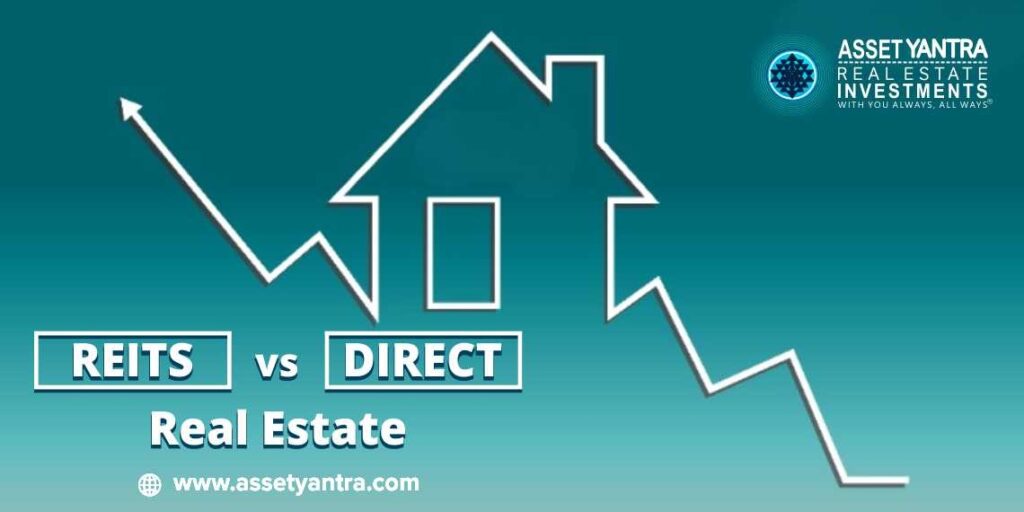Alternative investments like direct real estate and REITs are some of the most popular and trending topics in the world of investments. If you’re an investor who’s looking for a solid entry into this market, then you should consider Real Estate Investment Trust vs Direct Real Estate as one of your first considerations. REITs can be defined as real estate investment trusts that handle your investments and offer you a wide array of lucrative investment options in one go.
To be more precise, REITs are organizations that act like trusts and can be like mutual funds. Investing in REITs has many advantages, which are more than the ones you get from investing in direct real estate. But, if you wish to handle your investments autonomously, then investing in direct real estate will be the perfect fit for you.
Let’s get deeper into the world of popular alternative investments like commercial real estate and REITs, by learning about them in detail. So let’s go ahead.
What is Direct Real Estate?
Direct real estate can be defined as the practice of buying a piece of commercial real estate property, such as a business area or residential apartment directly, according to the wishes and requirements of a person. Investors investing in direct real estate earn their income through the help of rental income, appreciation, and the profit margin generated from various business activities that depend on the asset.
Benefits of investing in Direct Real Estate

One of the most prominent advantages of investing in direct real estate is that it generates a good amount of revenue. And also generates benefits from various tax exemptions using an income break. Let’s take an example that you can deduct various costs which are incurred during the maintenance and repair of the real estate asset that you’ve bought. Another tax-exempt is for depreciation in the value of the asset in commercial real estate that you’ve bought. You can reduce this from your income and thus save a lot on the taxable portion of your earnings.
Also there’s a good chance that the property or asset that you’ve bought using direct real estate investment can increase in value over time. Although the real estate market goes up and down sometimes, prices generally rise by a large % every year.
Other benefits of investing in direct real estate in India include that you possess a higher degree of control over making decisions regarding your asset. Which is usually not the case when investing in REITs in India.
Downsides of Investing in Direct Real Estate

One of the main downsides of investing in direct real estate is that you have to spend a lot of time and energy if you want to be successful. Some of the things you have to deal with include maintenance, emergencies, tenant issues, etc., as you’re the direct legal owner of the property.
Gathering the required capital or finance is another significant challenge when you’re investing in direct real estate. Also, direct real estate is not liquid. It means that you cannot quickly sell off your assets during an emergency, whenever you need money. Finding the right buyer will take time and effort, which makes selling direct real estate assets a hectic process.
What are REITs?

REIT are corporations that are responsible for the management of various residential and commercial real estate investments. It is a general corporation that is aimed at providing a wide variety of investment opportunities to investors who want to gain profits by pouring capital into this business instead of making direct real estate investments.
More than 225 REITs are listed on the stock exchanges in the United States. Investors in 35 countries around the world have registered REITs and offered them to investors.
Benefits of REITs Investing
One of the biggest benefits of investing in REITs is that investors don’t need to worry about any managerial aspects of the assets. Everything is managed by the organization, thus minimizing the chores and helping the investor focus on other areas of their life.
Also, the capital requirements are not that high, which means that one can invest in real estate with an amount much less than that of direct real estate investments. REITs also offer up to 90% of the taxable income to the investors and a 5% dividend yield.
Downsides of Investing in REITs
The Indian REITs business seems to be on a roll in recent years. The returns have been excellent, and many individuals have made a fortune by investing in REITs.
The fact that REITs are heavily leveraged is one of the possible drawbacks of investing in them. This implies that if underlying property prices fall, REITs will be obliged to sell the property and pay off the mortgage, potentially resulting in large losses for investors.
REITs vs Direct Real Estate; which one should you choose?
In India, both REITs and Direct Real Estate are popular investment options. But which one should you choose?
Here’s a look at the Pros and Cons of each option to help you make a decision:
REITs vs Direct Real Estate: Pros and Cons

REITs
Pros
- Diversification: By investing in a REIT, you can get exposure to a diversified portfolio of properties. This helps to mitigate the risk associated with any single property.
- Liquidity: REITs are listed on stock exchange, which makes them more liquid than direct real estate investment. This means you can easily buy or sell your units in a REIT.
- Professional Management: REITs are professionally managed, which means you don’t have to worry about the day-to-day management of the property.
Cons
- Lower Returns: The returns from direct real estate are typically higher than those from REITs.
- Higher Fees: REITs typically charge higher fees than direct real estate investments.
Direct Real Estate
Pros
- Higher Returns: The returns from direct real estate are typically higher than those from REITs.
- Lower Fess: Direct Real Estate investments typically charge lower fees than REITs.
- More Control: When you invest in direct real estate, you have more control over the property. For example, you can choose to renovate or not to renovate.
Cons
- Less Diversification: When you invest in direct real estate, you are not diversified across different properties. This means that your investment is more exposed to the risk associated with any single property.
- Illiquidity: Direct real estate is not listed on any stock exchange, which makes it less liquid than REITs. This means it may be harder to sell your investment.
- Management: When you invest in direct real estate, you are responsible for the day-to-day management of the property.
Takeaway
Now that you know the differences between direct real estate and REITs, you can easily choose between the two and take the first step toward the world of alternative investments. But, there should also be a reliable and convenient way to invest in them, right? Asset Yantra is the platform that you can choose for your alternative investments. A lot of attractive assets are available to choose from, with the option of fractional ownership.

